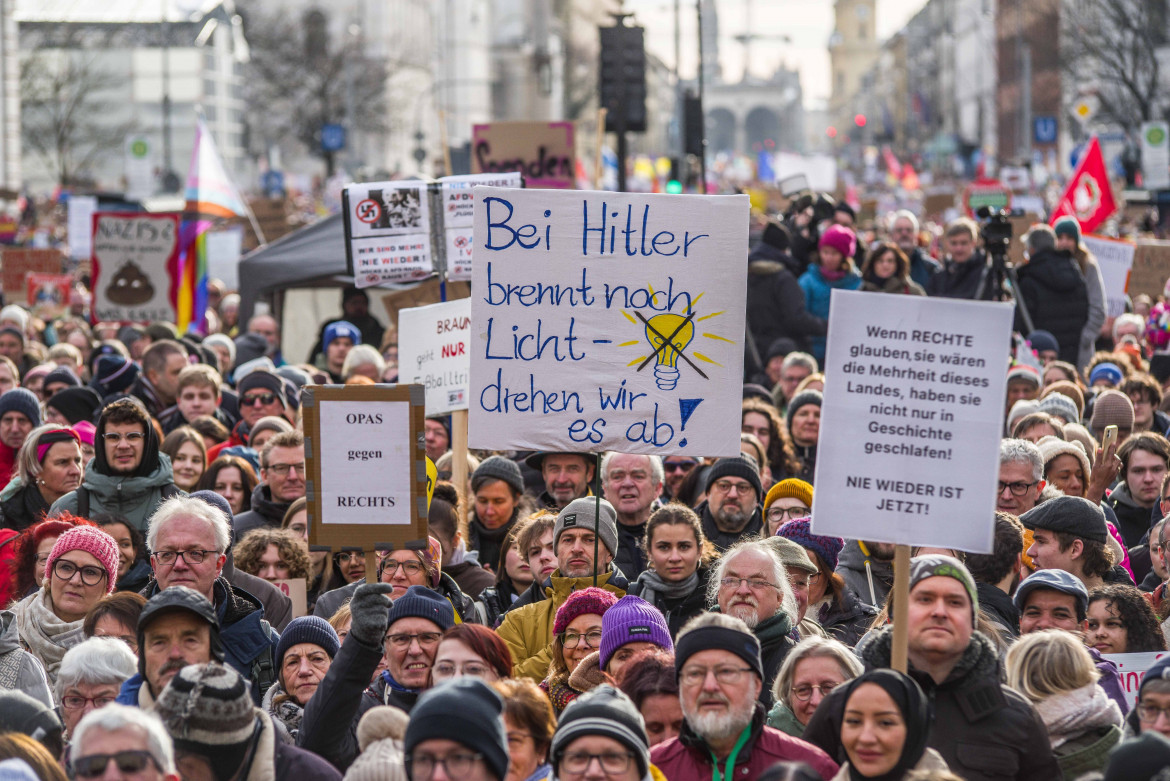Analysis
The message from the German streets is directed at all of the political forces
The demonstrations of the past few days have sent a clear message to the political forces: one does not fight authoritarian backsliding by repackaging the issues that the AfD has put at the center of its propaganda in a democratic format.

One and a half million people took to the streets, with tens and hundreds of thousands in the big cities and thousands more in many smaller towns, leading to some marches being suspended because too many people attended. The protests were seen all across Germany, surprisingly widespread geographically and showing unprecedented determination.
The marches that took place on Saturday and Sunday across the Federal Republic of Germany were against the extreme right, which is increasingly out in the open and aggressive with its xenophobic and authoritarian plans, and particularly against the AfD, the party that is currently polling in second place at above 20 percent, and which represents the guiding light, reference point and lynchpin for the whole archipelago of far-right groups: identitarian, Islamophobic, anti-Semitic, neo-Nazi and nostalgic for Kaiser Wilhelm’s Reich. The AfD, which began as a bourgeois party inclined towards nationalistic selfishness, has radicalized in the direction of a neo-Fascism which one no longer has to read between the lines.
However, it was not the political parties or the existing institutions that organized this incredible mobilization in which everyone took part, including the SPD, the CDU-CSU, the Greens, the FPD and Linke, as well as President Steinmeier and the Bundesbank governor. The marches were called by an ad hoc alliance of NGOs, grassroots groups and social movement representatives that could no longer sit by and watch the AfD’s rise towards government positions in the eastern Länder and perhaps even a decisive position in federal politics.
The image that the mainstream parties have subscribed to – of a large and united mobilization of “decent people” in defense of the “constitutional arc” – is rather misleading. In truth, the demonstrations of the past few days have sent a clear message to the political forces: one does not fight authoritarian backsliding by repackaging the issues that the AfD has put at the center of its propaganda in a democratic format. If we look at Chancellor Scholz promising to proceed with deportations “on a large scale,” the Greens’ newfound passion for rearmament, the Christian Democrat politicians always chasing the far right all the way onto the most dangerous terrain, with internal fringes of the CDU and CSU eager to collaborate with the AfD, we can see that the parties have been moving in a direction completely antithetical to the spirit of the weekend’s mobilizations. The protests have not displayed any eagerness to restore credit to the current government and lift it out of the deep crisis of popularity into which it has plunged; instead, they featured pointed criticism towards all the major parties.
We will see in the coming days whether and how the anti-fascist uprising will intersect and interact with the strikes and demonstrations by farmers, railroaders, and logistics workers against the austerity policy of the Berlin government – hopefully managing to keep the infiltration of the radical right at bay.
As for the direct target of the demonstrations, the AfD, a party that many would like to outlaw (a procedure that is neither easy nor quick and is fraught with political danger), the polls don’t seem to show that the wave of protests has affected it in the least. This highlights the level of polarization and conflict that would be produced should the AfD come to power in one form or another. The deep entrenchment of the right is now a given, and one can hardly harbor any illusions about the possibility of winning back most of those who have sided with it and returning them to a democratic political space.
This grassroots outcry, on the incredible scale we have seen in Germany, does not seem to involve any compromise, timidity or electoral opportunism, and it has made it very clear where the new fascism lurks and shows itself, in what behaviors and on what issues.
We could learn some lessons from this here in Italy, where we have become engrossed in the tedious dispute over the legal status of the Roman salute. When a central power claims to impose its will in a matter that should only concern the relationship between a mayor and the local citizens, as is happening in Bologna, that’s where fascism shows itself. When the government wants to impose limits on the right to strike, that’s where fascism shows itself. An exquisitely fascist policy shows itself in the friendly collaboration with Libyan slave traders – even when it’s a supposedly leftist tough guy pursuing it. The government in Rome features the friends and allies of the AfD, which, together with the neo-Nazis, is considering plans for mass deportation against which the vast majority of Germans have revolted. They substantively share the same political orientation. But the opposition in Italy is struggling to see and name real fascism where it currently exists, distracted by disputes over the theatrics of the black shirts.
Originally published at https://ilmanifesto.it/il-messaggio-delle-piazze-tedesche-e-a-tutte-le-forze-politiche on 2024-01-23
